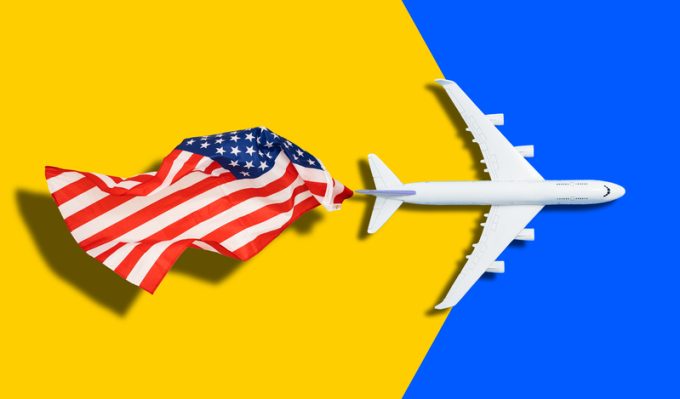Departing CFO claims Freightos will see profit in 2026 after reporting Q3 loss
UPDATED 28.11.24 TO INCLUDE FREIGHTOS INPUT AND REMOVE REFERENCE TO GUILLAUME HALLEUX Freightos’ share price fell ...
FDX: ABOUT USPS PRIVATISATIONFDX: CCO VIEWFDX: LOWER GUIDANCE FDX: DISRUPTING AIR FREIGHTFDX: FOCUS ON KEY VERTICALFDX: LTL OUTLOOKGXO: NEW LOW LINE: NEW LOW FDX: INDUSTRIAL WOESFDX: HEALTH CHECKFDX: TRADING UPDATEWMT: GREEN WOESFDX: FREIGHT BREAK-UPFDX: WAITING FOR THE SPINHON: BREAK-UP ALLUREDSV: BREACHING SUPPORTVW: BOLT-ON DEALAMZN: TOP PICK
FDX: ABOUT USPS PRIVATISATIONFDX: CCO VIEWFDX: LOWER GUIDANCE FDX: DISRUPTING AIR FREIGHTFDX: FOCUS ON KEY VERTICALFDX: LTL OUTLOOKGXO: NEW LOW LINE: NEW LOW FDX: INDUSTRIAL WOESFDX: HEALTH CHECKFDX: TRADING UPDATEWMT: GREEN WOESFDX: FREIGHT BREAK-UPFDX: WAITING FOR THE SPINHON: BREAK-UP ALLUREDSV: BREACHING SUPPORTVW: BOLT-ON DEALAMZN: TOP PICK

The three US mega-airlines – Delta, United and American – expanded their cargo traffic in the second quarter, but they only got a nibble at the rising volumes of ecommerce flowing out of China to their home turf.
The airlines performed well overall in the quarter, with Delta and American posting record revenues, and while all three saw gains in cargo ton-km (CTK), only Delta and United saw growth in freight revenue, whereas American reported a slight decrease.
Delta, which saw adjusted total revenues jump 5.4% year on year, to a record $15.4bn, showed the largest gain in percentage terms on the freight side – just as Ceva’s Peter Penseel arrived to head the cargo arm.
Cargo revenues rose 16%, to $199m, which brought its tally for the first half to $377m, down 1% from the result 12 months earlier.
United reported a 5.7% gain in operating revenue, to $15bn, outpaced by a 14.4% surge in its cargo revenue, to $414m, in the quarter. Revenue ton-km (RTK) was up 16%, at $890m.
RTK also rose 16% for the first half of the year, to 1.7bn, while cargo revenues reached $805m, up 6% over the first six months of 2023.
American Airlines, the last of the trio to publish its results, tabled a new quarter record of $14.3bn in revenues. This was below management’s initial expectations, owing to a domestic imbalance in traffic and the carrier’s sales and distribution strategy, which is undergoing change.
Cargo revenue declined 1.3%, to $195m, despite a 21% increase in cargo ton-miles, as yield per ton-mile fell 18%, to 37.87 cents. For the first half of the year, American posted a 9% drop in cargo revenue, to $382m.
For most of this year, North American carriers have lagged their international peers in terms of traffic growth, IATA statistics show. In May, their collective CTK growth of 8.7% was the lowest on the planet. In the first five months of the year, North American CTKs were up 6% – the only region not showing double-digit growth in traffic.
Likewise, North American carriers brought up the rear in terms of capacity expansion, compared with airlines from other regions. Growth of 2.5% in May and 2% for the January-May period was lower than elsewhere.
In May, nine global trade sectors registered double-digit expansion in airfreight demand, with Asia-North America showing the lowest gain, of 12%. Transatlantic traffic rose 8.9% and intra-Americas CTK slowed, from double-digit growth the previous month to just 3.3%.
Moreover, US airlines have been more or less bystanders when it comes to the tidal wave of e-commerce that has boosted global airfreight volumes and yields. Passenger flights between the US and China remain at low levels because of the uneven playing field – Chinese carriers not being banned from Russian airspace.
While a number of forwarders have been using regular cargo charters to move their traffic from China to the US, American carriers have only been able to field a fraction of their pre-Covid capacity in this sector.
And capacity is not likely to expand significantly in the coming months. In its outlook for the third quarter, Delta’s management predicted decelerating capacity growth.
At the moment, Delta’s flying has also been hobbled by repercussions from the CrowdStrike outage, which hit the carrier harder than its US peers. It had to cancel about 1,200 flights on each of last Friday, Saturday and Sunday.
On Monday, when United and American were back to normal operations, Delta still had to cancel more than 700 flights, and the problems continued in the following days. On Tuesday the US Department of Transportation opened an investigation into the airline’s handling of the incident.
On the cargo side, this was Delta’s second IT outage in a month: on 26 June, a glitch shut down Delta Cargo’s automated booking.
Delta and United have expanded their online booking access this year through agreements with WebCargo.
Check out this clip from today’s Loadstar Podcast on IATA’s CASS fail
Comment on this article